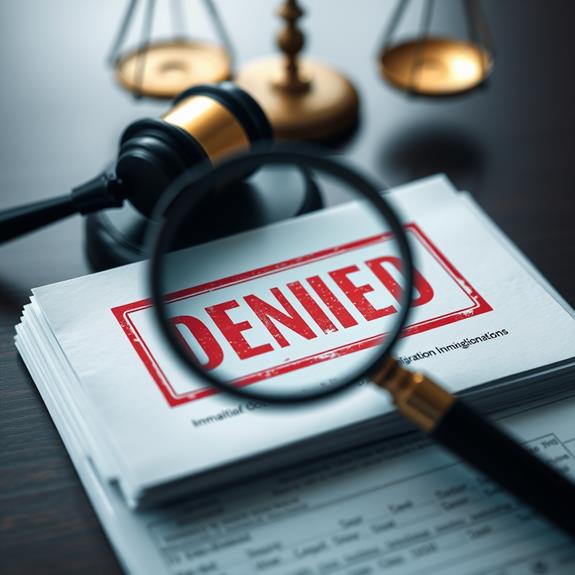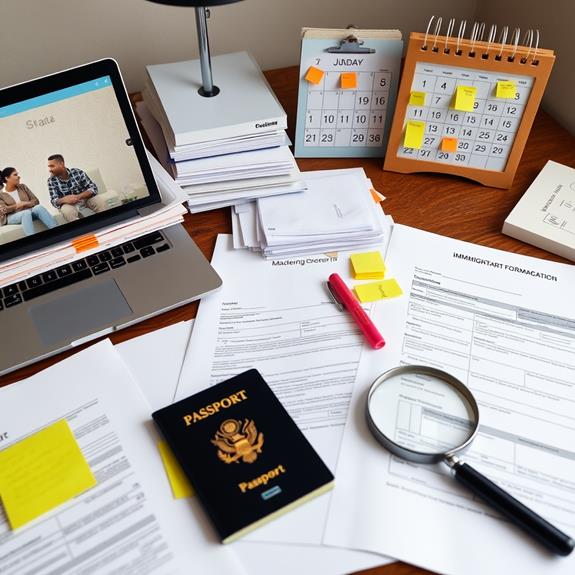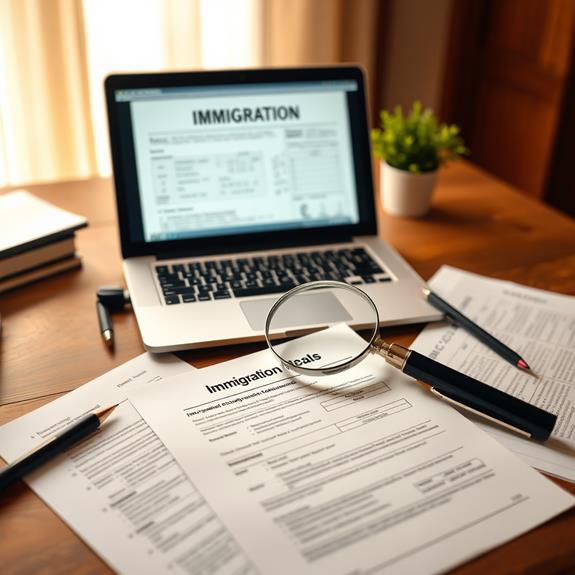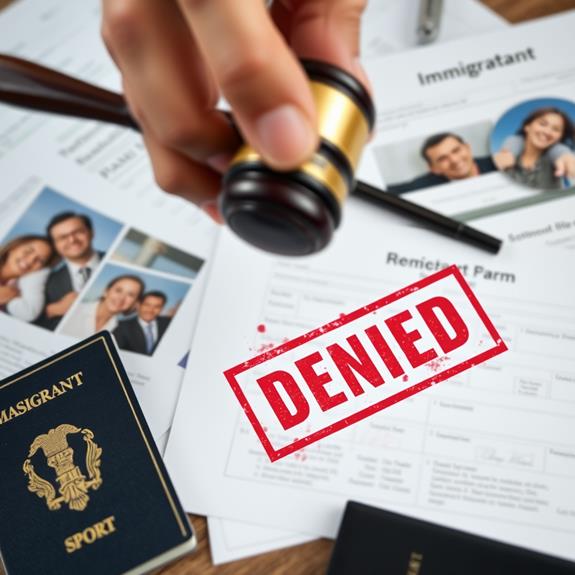To appeal a denied family-based visa application, you'll need to act quickly and thoroughly. First, review the denial letter carefully to understand the specific reasons for rejection. Gather new supporting documents that address these issues, including legal papers, relationship evidence, and expert attestations. Complete the appeal form accurately, ensuring you meet all submission guidelines and deadlines. Craft a compelling appeal statement that clearly addresses each denial reason with new information and personal narratives. Consider seeking legal representation to strengthen your case. Remember, the process can be complex and time-consuming, but with careful preparation, you can improve your chances of success. The following sections offer more detailed guidance on each step.
Understanding Family-Based Visa Denials

Family-based visa denials often stem from specific issues in the application process. These rejections can be frustrating, but understanding the reasons behind them is essential. Common grounds for denial include incomplete documentation, failure to prove visa eligibility, or issues with establishing valid familial relationships. Expert legal assistance can help minimize delays and guarantee compliance with regulations, reducing the chances of denial.
Immigration officials carefully review each application to guarantee all requirements are met. They look for clear evidence of your relationship to the U.S. citizen or permanent resident sponsoring you. This might involve birth certificates, marriage licenses, or adoption papers. Financial requirements also play a role, as your sponsor must show they can support you financially.
Sometimes, denials occur due to inadmissibility factors. These can include criminal history, health-related issues, or previous immigration violations. It's important to be honest about your background and address any potential red flags upfront.
Understanding these common reasons for denial can help you strengthen your application if you choose to reapply or appeal. Pay close attention to the specific reasons cited in your denial letter. This information will guide your next steps and improve your chances of a successful outcome.
Common Reasons for Application Rejection
When your visa application is rejected, it's often due to common issues you can address. Incomplete documentation submission is a frequent problem, where you've failed to provide all the required paperwork or evidence. Another major reason for rejection is ineligibility criteria issues, which might include not meeting financial requirements, having a criminal record, or failing to prove strong ties to your home country. For employment-based visas, rejections may occur due to issues with the PERM Certification process or inadequate proof of extraordinary abilities for EB-1 category applicants. Another common reason for denial is the presence of inadmissibility grounds, which may require filing for specific waivers.
Incomplete Documentation Submission
Among the most common reasons for visa application rejections, incomplete documentation submission stands out as a frequent culprit. It's essential to understand the application process and follow submission guidelines meticulously. When you fail to provide all required documents, your application may be denied outright or face significant delays. Immigration attorneys can provide invaluable assistance in making sure your documentation is complete and accurate, minimizing the risk of rejection.
To avoid this issue, make sure you:
- Review the checklist provided by the immigration authorities
- Double-check that all forms are filled out completely and accurately
- Include all supporting documents, such as financial records and proof of relationship
Remember, each visa category has specific requirements. What's needed for a spouse visa might differ from a parent visa. It's your responsibility to gather and submit all necessary paperwork. If you're unsure about any document, don't hesitate to seek clarification from official sources or consult an immigration attorney.
Incomplete submissions can lead to frustrating setbacks in your family reunification plans. By paying close attention to detail and following instructions carefully, you'll increase your chances of a successful application. Take the time to organize your documents thoroughly before submission.
Ineligibility Criteria Issues
Numerous ineligibility criteria can lead to visa application rejections, even if you've submitted all the required documents. These criteria are set by immigration authorities to guarantee applicants meet specific standards. Common reasons for ineligibility include criminal history, health issues, and security concerns. Your visa eligibility may be affected if you have a communicable disease or a history of drug abuse. Additionally, if you've overstayed a previous visa or have been deported, you might face difficulties.
Financial stability is another significant factor. You must demonstrate that you won't become a public charge in the United States. This means showing sufficient income or assets to support yourself and your dependents. Immigration criteria also consider your ties to your home country. If officials believe you're likely to overstay your visa, they may deny your application. Previous immigration violations, such as working without authorization, can also lead to rejection. It's important to review the specific visa eligibility requirements for your category before applying. If you're unsure about your eligibility, consult with an immigration attorney who can assess your situation and advise on potential issues.
Gathering Supporting Documentation

When you're gathering supporting documentation for your visa appeal, you'll need to focus on three key areas. Start by collecting all necessary legal documents, such as passports, birth certificates, and previous visas. Next, compile evidence of personal relationships, including photographs, correspondence, and travel records. Finally, obtain expert attestations or professional opinions that support your case, such as letters from employers or academic institutions.
Collect Necessary Legal Documents
In light of your visa denial, gathering the right supporting documentation is vital for a successful appeal. You'll need to collect necessary legal documents to support your case. Start by reviewing visa application checklists to guarantee you've included all required paperwork. These checklists can help you stay organized and avoid missing critical items.
When collecting your legal documents, focus on:
- Personal identification: passport, birth certificate, and national ID card
- Financial records: bank statements, tax returns, and proof of employment
- Family relationships: marriage certificates, birth certificates of children, and affidavits of support
Organize your documents systematically, using document organization tips to keep everything in order. Create a file system with clear labels for each category of documents. This will help you quickly locate and present the necessary information during your appeal process.
Remember to include any new evidence that addresses the reasons for your initial denial. This could be updated financial information, additional proof of family ties, or clarification of any misunderstandings in your original application. By thoroughly preparing your legal documents, you'll strengthen your appeal and increase your chances of a favorable outcome.
Compile Personal Relationship Evidence
Beyond official documents, compiling personal relationship evidence can greatly strengthen your visa appeal. This step involves gathering materials that demonstrate the genuine nature of your family connection. Start by creating relationship timelines that show the progression of your bond. Include key dates, milestones, and shared experiences.
Collect photographs that span your relationship's duration. Choose images that depict various occasions and interactions with family members. Include pictures from holidays, celebrations, and everyday moments. Gather correspondence such as emails, letters, and text messages that showcase ongoing communication. Save call logs or video chat records to prove regular contact.
Compile evidence of financial support, if applicable. This can include money transfer receipts, shared bank accounts, or bills in both names. Collect statements from friends and family who can attest to the authenticity of your relationship. These should describe your emotional connections and interactions they've witnessed.
Consider including travel records that show visits between family members. Tickets, itineraries, and passport stamps can support your case. Remember to organize all evidence chronologically and clearly label each item for easy reference during the appeal process.
Obtain Expert Attestations
Expert attestations can greatly bolster your visa appeal. These are professional opinions or statements from qualified individuals who can vouch for the legitimacy of your relationship or provide insights into your specific situation. To obtain expert attestations, consider reaching out to:
- Immigration lawyers
- Cultural experts familiar with your home country's customs
- Religious leaders or officiants who've interacted with you and your spouse
When requesting testimonial letters, provide clear instructions on what information you need. Ask experts to focus on relevant aspects of your case, such as the authenticity of your relationship or cultural factors that may have influenced your application. Ascertain that each expert opinion is detailed, well-reasoned, and directly addresses the reasons for your visa denial.
Remember to choose experts with credible backgrounds and relevant expertise. Their qualifications should be clearly stated in their attestations. If possible, obtain expert opinions from individuals who have firsthand knowledge of your situation. These testimonials can provide valuable context and support for your appeal, potentially swaying immigration officials to reconsider their decision.
Filing the Appeal Form
The appeal form serves as your formal request for reconsideration. It's essential to fill it out accurately and completely. Start by gathering all the necessary documents, including your original visa application and the denial letter. Read the form carefully, making certain you understand each question before answering.
When developing your appeal strategies, focus on addressing the specific reasons for denial mentioned in your rejection letter. Provide new evidence or clarify misunderstandings that may have led to the initial rejection. Be concise yet thorough in your explanations. Remember to stay factual and avoid emotional arguments.
Follow the submission guidelines precisely. Pay attention to deadlines, required signatures, and any additional documentation needed. Double-check that you've included all necessary fees. If possible, have a legal expert review your form before submission.
Make copies of everything you submit. Send your appeal via a trackable mail service to guarantee it reaches its destination. Keep records of all correspondence related to your appeal. Be prepared for a potentially lengthy process, as visa appeals can take several months to resolve.
Crafting a Compelling Appeal Statement

While filing the appeal form is a critical step, your appeal statement is where you'll truly make your case. This document allows you to explain why you believe the visa denial was incorrect. It's your chance to address any concerns raised by the consular officer and provide additional evidence to support your application.
When crafting your appeal statement, focus on these key elements:
- Clarity: Present your arguments in a logical, easy-to-follow manner
- Evidence: Include new information or documentation that strengthens your case
- Emotional impact: Share personal stories that highlight the importance of the visa approval
Use persuasive techniques to make your statement compelling. Start with a brief summary of your situation and why you're appealing. Then, address each reason for denial individually, providing clear explanations and supporting evidence. Be honest and factual, avoiding exaggeration or emotional manipulation.
Remember to keep your language respectful and professional. Proofread your statement carefully to eliminate errors. If possible, have someone else review it for clarity and effectiveness. A well-crafted appeal statement can greatly increase your chances of a successful outcome.
Legal Representation Options
Considering the complexities of visa appeals, you might want to explore legal representation options. An immigration lawyer can provide valuable guidance and improve your chances of success. These professionals understand the intricacies of family sponsorship and can develop effective appeal strategies tailored to your case.
When seeking legal aid, start by researching reputable immigration attorneys in your area. Many offer free initial consultations, allowing you to discuss your case and assess their expertise. During these meetings, ask about their experience with visa appeals and their success rates. It's essential to choose a lawyer who specializes in immigration law and has a track record of handling cases similar to yours.
If you're concerned about costs, explore affordable representation options. Some organizations provide pro bono or low-cost legal services for immigrants. Additionally, law school clinics may offer assistance under the supervision of experienced attorneys. Remember, while legal representation isn't mandatory for visa appeals, it can substantially enhance your chances of overturning a denial. An attorney can help you navigate the complex appeal process, guarantee all necessary documents are submitted correctly, and present your case effectively to immigration authorities.
Timeline and Next Steps

Clocks tick relentlessly when you're facing a visa denial, making it vital to understand the timeline and next steps for your appeal. The appeal process typically begins within 30 days of receiving your denial notice. During this time, you'll need to gather supporting documents and prepare your case.
Timeline expectations vary depending on the complexity of your situation, but generally, you can anticipate:
- Filing your appeal within 30 days
- Receiving an acknowledgment from USCIS within 2-4 weeks
- Waiting 6-12 months for a decision on your appeal
Next, you'll need to submit Form I-290B, along with the required fee and any additional evidence. Be sure to clearly explain why you believe the denial was incorrect. If you're working with an attorney, they'll guide you through this process.
While waiting for a decision, it's essential to maintain your legal status in the country. Don't assume your appeal will be approved. Instead, explore alternative visa options or prepare for the possibility of leaving the country if necessary. Stay informed about your case status by regularly checking the USCIS website or contacting your legal representative.

